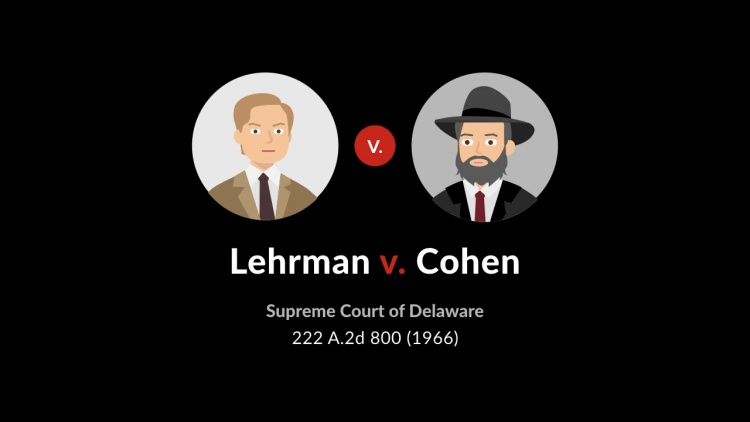Lehrman v. Cohen
Supreme Court of Delaware
43 Del. Ch. 222, 222 A.2d 800 (1966)
- Written by Mary Pfotenhauer, JD
Facts
Giant Food Inc. (the Company) was incorporated in Delaware in 1935 by N.M. Cohen (defendant) and the father of Jacob Lehrman (plaintiff). Cohen acted as president of the Company. The Company’s voting stock was equally divided between the Cohen family, who held Class AC common stock, and the Lehrman family, who held Class AL common stock. Each class was entitled to elect two members of the four-member board of directors. To avoid deadlock between the AL and AC stock, a fifth director office was created. The AC and AL stockholders voted unanimously to amend the Company’s certificate of incorporation to create an AD class of common stock. The Class AD stock consisted of a single share, and the certificate of incorporation provided that its holder was entitled to vote for and elect one of the five directors, but was not entitled to receive dividends or share in any distribution of corporate assets. The board of directors unanimously issued the share of Class AD stock to Joseph Danzansky, and Danzansky voted his share of AD stock to elect himself as the Company’s fifth director. In 1964 a resolution was proposed to give Danzansky an executive employment contract and salary. The AC and AD stockholders voted in favor of the resolution, and the AL stock voted against it. The board of directors elected Danzansky president of the Company, with the AC and AD directors voting in favor, and the AL directors voting in opposition. Danzansky resigned his position as director to begin serving as the Company’s president, and a new director was elected to take the vacant position. Lehrman brought suit, claiming that the creation of the Class AD stock was illegal under Delaware law because it is a voting trust that is not limited to a ten year period as required by Delaware’s Voting Trust Statute. The lower court granted summary judgment in favor of the defendants, and Lehrman now appeals.
Rule of Law
Issue
Holding and Reasoning (Herrmann, J.)
What to do next…
Here's why 907,000 law students have relied on our case briefs:
- Written by law professors and practitioners, not other law students. 47,100 briefs, keyed to 996 casebooks. Top-notch customer support.
- The right amount of information, includes the facts, issues, rule of law, holding and reasoning, and any concurrences and dissents.
- Access in your classes, works on your mobile and tablet. Massive library of related video lessons and high quality multiple-choice questions.
- Easy to use, uniform format for every case brief. Written in plain English, not in legalese. Our briefs summarize and simplify; they don’t just repeat the court’s language.





